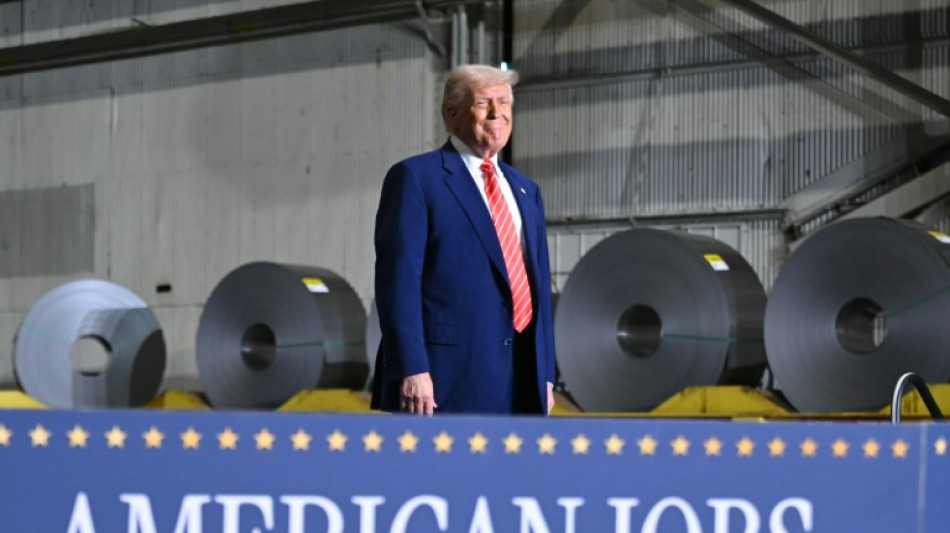
-
 Real Madrid thrash Kairat with Mbappe hat-trick
Real Madrid thrash Kairat with Mbappe hat-trick
-
Deepti, Amanjot fire as India crush Sri Lanka in Women’s World Cup opener

-
 Deadlines loom for Milan's Olympic village as Winter Games near
Deadlines loom for Milan's Olympic village as Winter Games near
-
At least 5 dead after strong quake in central Philippines
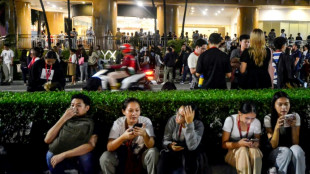
-
 Estonia PM says Russia incursions aim to distract EU from Ukraine: AFP interview
Estonia PM says Russia incursions aim to distract EU from Ukraine: AFP interview
-
DR Congo ex-president Kabila sentenced to death in absentia for 'treason'

-
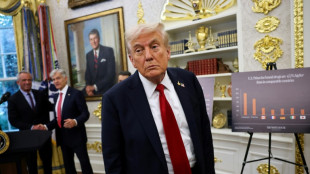 Trump says US government will 'probably' shut down
Trump says US government will 'probably' shut down
-
Board of Spain's Sabadell bank rejects improved BBVA takeover bid

-
 Howe blasts irrelevant criticism of Woltemade after 'idiot' jibe
Howe blasts irrelevant criticism of Woltemade after 'idiot' jibe
-
Erasmus ready for 'high stakes' Argentina clash in Rugby Championship finale

-
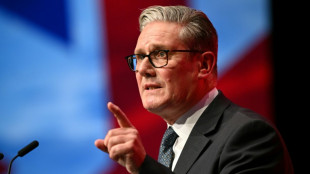 Starmer vows to fight for Britain's 'soul', thwart far right
Starmer vows to fight for Britain's 'soul', thwart far right
-
Strong quake causes damage, panic in central Philippine island
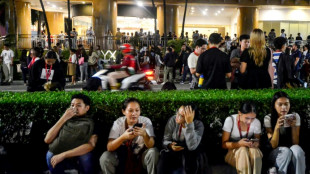
-
 PSG must keep Barca's 'Harry Potter' Pedri at bay: Luis Enrique
PSG must keep Barca's 'Harry Potter' Pedri at bay: Luis Enrique
-
'I couldn't reach them': Afghans abroad despair at blackout

-
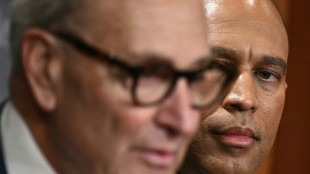 US stocks slip as government shutdown looms
US stocks slip as government shutdown looms
-
Key warns England not to be 'stupid' on Ashes tour

-
 UN calls for Taliban to restore internet as Afghanistan goes dark
UN calls for Taliban to restore internet as Afghanistan goes dark
-
Saliba says he was focused on staying at Arsenal after signing new deal

-
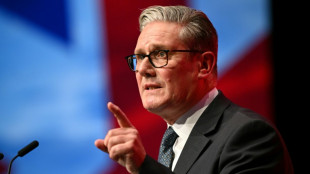 Starmer vows to fight for 'decent' Britain, as he battles Farage
Starmer vows to fight for 'decent' Britain, as he battles Farage
-
US on brink of government shutdown with funding talks stalled

-
 Human skin cells turned into fertilisable eggs for first time
Human skin cells turned into fertilisable eggs for first time
-
UN warns Myanmar conflict blocking Rohingya return

-
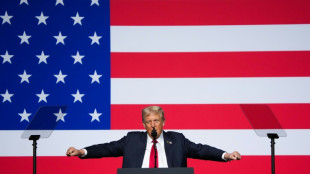 Trump tells generals US faces 'war from within'
Trump tells generals US faces 'war from within'
-
Williams absence 'could help us', say Dortmund as Guirassy back against Athletic

-
 Louis Vuitton unveils ethereal collection at Paris Fashion week
Louis Vuitton unveils ethereal collection at Paris Fashion week
-
ECB chief says eurozone weathering Trump tariff storm
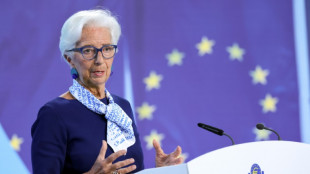
-
 Nche starts for South Africa as they eye Rugby Championship title against Argentina
Nche starts for South Africa as they eye Rugby Championship title against Argentina
-
AI tool helps researchers treat child epilepsy
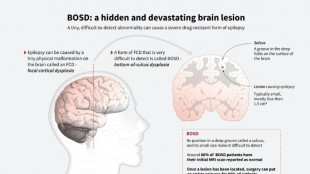
-
 Brigitte Bardot slams Saint-Tropez after decades in jet-set port
Brigitte Bardot slams Saint-Tropez after decades in jet-set port
-
Pentagon chief tells US military leaders to fix 'decades of decay'
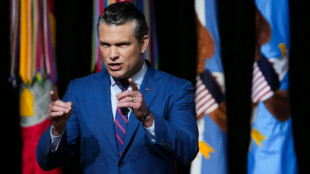
-
 Spotify founder Daniel Ek to give up CEO role
Spotify founder Daniel Ek to give up CEO role
-
Barca star Yamal must 'work hard' to reach top level, says Flick

-
 EU green lights Prada's bid for Versace
EU green lights Prada's bid for Versace
-
New youth-led protests in Madagascar despite government's dismissal

-
 Sinner to face teenager Tien in Beijing final as Gauff battles on
Sinner to face teenager Tien in Beijing final as Gauff battles on
-
Gold hits record, dollar drops as US shutdown looms
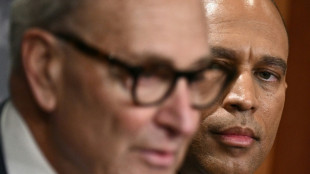
-
 Hamas reviewing Trump's Gaza plan
Hamas reviewing Trump's Gaza plan
-
Alcaraz beats Fritz in Tokyo for eighth title of season

-
 Vietnam jails former officials over gold bar graft: state media
Vietnam jails former officials over gold bar graft: state media
-
German far-right MP's ex aide jailed for spying for China

-
 Who will take 30,000 asylum seekers? EU solidarity faces big test
Who will take 30,000 asylum seekers? EU solidarity faces big test
-
PSG's Kvaratskhelia to miss Barcelona Champions League trip

-
 Endometriosis test backed by French government under scrutiny
Endometriosis test backed by French government under scrutiny
-
Madagascar protesters undeterred despite sacking of government

-
 Saliba signs new long-term deal at Arsenal
Saliba signs new long-term deal at Arsenal
-
Sinner powers into Beijing final as Gauff survives Bencic test

-
 Madagascar protesters mobilise despite firing of government
Madagascar protesters mobilise despite firing of government
-
Gauff calls for shorter tennis seasons as 'impossible' to play more

-
 Hamas yet to respond on Trump's Gaza plan
Hamas yet to respond on Trump's Gaza plan
-
Long-lasting Typhoon Bualoi devastates Vietnam, killing 19


Trade war cuts global economic growth outlook: OECD
The OECD slashed its annual global growth forecast on Tuesday, warning that US President Donald Trump's tariffs blitz will stifle the world economy -- hitting the United States especially hard.
After 3.3 percent growth last year, the world economy is now expected to expand by a "modest" 2.9 percent in 2025 and 2026, the Paris-based Organisation for Economic Co-operation and Development.
In its previous report in March, the OECD had forecast growth of 3.1 percent for 2025 and 3.0 percent for 2026.
Since then, Trump has launched a wave of tariffs that has rattled financial markets.
"The global outlook is becoming increasingly challenging," said the OECD, an economic policy group of 38 mostly wealthy countries.
It said "substantial increases" in trade barriers, tighter financial conditions, weaker business and consumer confidence, and heightened policy uncertainty will all have "marked adverse effects on growth" if they persist.
The OECD holds a ministerial meeting in Paris on Tuesday and Wednesday, with US and EU trade negotiators expected to hold talks on the sidelines of the gathering after Trump threatened to hit the European Union with 50-percent tariffs.
The Group of Seven advanced economies is also holding a meeting focused on trade.
"For everyone, including the United States, the best option is that countries sit down and get an agreement," OECD chief economist Alvaro Pereira said in an interview with AFP.
"Avoiding further trade fragmentation is absolutely key in the next few months and years," Pereira said.
Trump imposed in April a baseline tariff of 10 percent on imports from around the world.
He unveiled higher tariffs on dozens of countries but has paused them until July to allow time for negotiations.
The US president has also imposed 25 percent tariffs on cars and now plans to raise those on steel and aluminium to 50 percent on Wednesday.
- US slowdown -
In the OECD report, Pereira warned that "weakened economic prospects will be felt around the world, with almost no exception".
He added that "lower growth and less trade will hit incomes and slow job growth".
The outlook is particularly gloomy for the United States.
The US economy is now expected to grow by just 1.6 percent this year, down from 2.2 percent in the previous outlook, and slow further to 1.5 percent in 2026, the OECD said.
"This reflects the substantial increase in the effective tariff rate on imports and retaliation from some trading partners," the OECD said.
The effective tariff rate on US merchandise imports has gone from two percent in 2024 to 15.4 percent, the highest since 1938, the OECD said.
The OECD also blamed "high economic policy uncertainty, a significant slowdown in net immigration, and a sizeable reduction in the federal workforce".
While annual inflation is expected to "moderate" among the Group of 20 economies to 3.6 percent in 2025 and 3.2 percent in 2026, the United States is "an important exception".
US inflation is expected to accelerate to just under four percent by the end of the year, two-times higher than the Federal Reserve's target for consumer price increases.
- Rising risks -
The OECD slightly reduced its growth forecast for China -- which was hit with triple-digit tariffs that have been temporarily lowered -- from 4.8 to 4.7 percent this year.
Another country with a sizeable downgrade is Japan: the OECD cut the country's growth forecast from 1.1 percent to 0.7 percent.
The outlook for the eurozone economy, however, remains intact with one percent growth.
"There is the risk that protectionism and trade policy uncertainty will increase even further and that additional trade barriers might be introduced," Pereira wrote.
"According to our simulations, additional tariffs would further reduce global growth prospects and fuel inflation, dampening global growth even more," he said.
D.Schaer--VB
